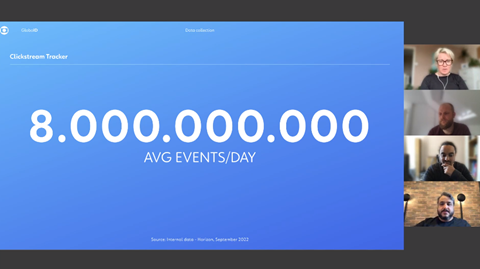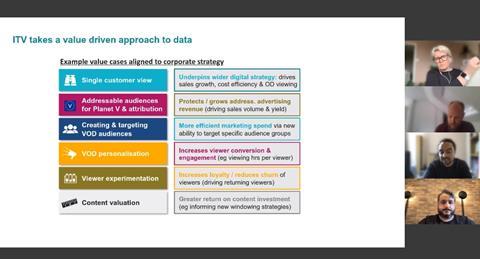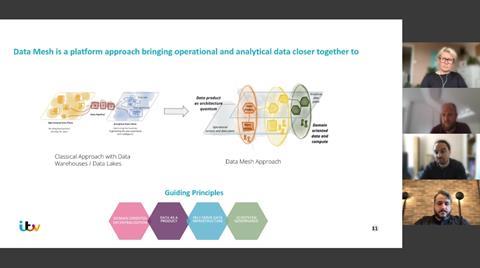It has never been more important to understand your customers, a fact that media and broadcasters have always been well aware of, and in today’s digital environment there are many ways of slicing that cake, discovers Mark Mayne.
Data on viewing habits and media consumption is now available on a vast scale, but interrogating it successfully is a challenge in itself. However, being able to do so is crucial for media companies, both in the immediate term but also for future revenue growth.

The latest IBC webinar, Understanding the media consumer through data: A single customer view of the world took a high-level view of this complex and challenging topic, starting with a series of presentations from the expert panel. With high-level representatives from ITV, Globo and UKTV present the conversation flowed, with Mike Leverington, Director of Data Experimentation, ITV immediately tackling the central theme of the webinar head on.
“At ITV - given our data mesh approach - we’ve not actively created a single customer view. What we’ve honed in on is: how do we effectively identify a viewer and off the back of identifying that viewer, ensuring the correct governance is followed - obviously - around the advertising and marketing that we serve to that viewer.
“So our whole infrastructure and customer view is based around the advertising value cases and our marketing value cases. So are we making sure we’re contacting a single customer with marketing about a new show coming out? Are we making sure that we’re promoting relevant advertising for one of our clients, to customers in the relevant show, and if we can be assured it’s a single household or a single viewer, and doing that.
I think from a broadcasting perspective, we’re not trying to marry up a customer view that includes all of our 34 million broadcast viewers, we will use panel data for that and we’re happy to accept that gap.”
ROI should be front and centre
“We’re really focused on digital and the reason for that is return on investment. We know that ROI depends on focusing on a digital viewer, and through a digital lens as opposed to trying to do it from that broadcast lens as well because it will just create a big amount of cost for us, basically”, summarised Leverington.

Andy Isaacs, Head of Audience and Analytics, UKTV agreed: “I think our approach is actually very similar to ITV, to be honest. Much as I would love to kind of build a single customer view that had real customer data and build all those fancy models to do it - I can’t justify it!
“It’s absolutely about getting user consent, getting the user’ ’OK’, but equally we are going to send you advertising whether it is targeted or not. So that effectively is the foundation of it, but then it’s about having the right relationships with both your consumer and with parties where you might agree to share data with it to kind of get that greater view and that is absolutely completely consent based.
“It’s absolutely establishing [what data] that user shares with you and the information that they give you by consuming your [media] products and then building modules around that based on what they share, and what value they feel they get back from it.”
GDPR and governance are key concerns
Isaacs continued to highlight the complexity of GDPR implications and how those are managed at UKTV: “We very much limit the amount of personally identifiable information that we share with tools so we have an email address, channel four have no idea what that email address is. It’s not like they’re trying to serve a consumer across both our channels and their channels and their platforms and put the ad frequency caps on across our two channels, it is a separate viewer, which helps! We are sharing PII as possible - you’ve got behavioural data, you know what people watch but it’s just off an ID, it’s not off anything that could be traced back to an individual without a lot of work.”

Leverington took up the complex and highly evolved governance tale at ITV: “We’ve been talking so far about decentralised cross functional data teams, but there is one team at ITV that is centralised, and that is our data governance team - so it’s a group governance function.
“Effectively we have two big verticals - studio vertical and producer content and then a broadcasting vertical that distributes and promotes it. We have two separate data governance teams for those areas, to make sure that there’s guardrails, templates and strict governance in place for how data is used.
“We know that we’ve got everything documented to justify how that data is used, we can understand the data lineage and what the data means and then distribute that capital around the organisation so people know what data is available.
“I think as I mentioned previously, really heavily that ITV uses the consent based model. We wait for people to raise their hand, then use their data after they’ve raised their hand saying that usage is acceptable.
“So if you are in the UK and you take out a premium ITX subscription, there’s a journey and we have documented that journey and highlighted at every stage what we’re going to use your data for”, he concluded.
Igor Macaubas, Director of Digital Platforms, Globo has a different approach: “I think it helps a lot to have the global ID because it fuels our data strategy and helps us to better manage this information. We do also have a centralised data governance area that kind of oversees every everyday application that we have. We also have a very strong connection with our legal department, but we do have a slightly more complex picture in terms of regulation. We not only operate in Brazil, [but also] the US so we must comply with local state regulations like CCPA, and Europe too.
“All the legislation is loosely based on GDPR but there are slightly different approaches and we need to adapt [to suit]. The unified, global ID approach helps us a lot here, since we have the unique ID it doesn’t matter actually who the individual is, what matters is the hash that we generate out of the personality info that we can match with another hash that the telco company will give us.”
“It’s very important to have strong, centralised governance overseeing everything because otherwise, things get wild!”
Flexibility and cultural change both part of the mix
Among the closing advice came a particular gem from Isaacs: “Try and be flexible in how you build something out. Your strategy, and your data strategy is going to change. You don’t want to kind of have to uproot all the technology in your infrastructure when your datacenter changes. Try and build flexibility in.”
Leverington took the final word: “Always put time and effort into driving the cultural change in the organisation. A lot of digital strategies and digital transformation strategies can end up failing because it eventually comes down to ‘putting in a piece of tech’. [The questions you should ask are] What are the people doing now? How’s it going to be in the future? How’s it going to take them on that journey?”
Watch the webinar Understanding the media consumer through data: A single customer view of the world on demand now, and get the full range of insights from the expert panel. Alternatively, check out the full on-demand IBC webinar catalogue and/or register for any upcoming IBC 2023 webinar topics that appeal.
Read more IBC365’s 2023 webinar programme
























No comments yet